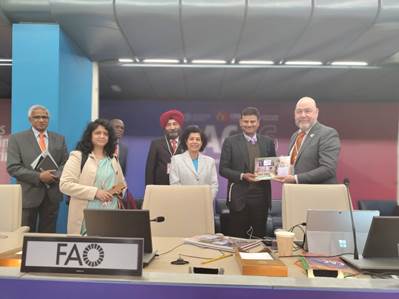India has secured a unanimous mandate for a fresh term on the Executive Committee of the Codex Alimentarius Commission (CCEXEC), reaffirming its leadership role in shaping global food standards at the 48th session of the Codex Alimentarius Commission (CAC48). The re-election extends India’s representation for the Asia region until the end of CAC50 in 2027, the Ministry of Health and Family Welfare said.
Led by Rajit Punhani, Chief Executive Officer of the Food Safety and Standards Authority of India (FSSAI), the Indian delegation included officials from the Health Ministry and technical bodies. According to the ministry, India’s mandate highlighted its commitment to collaborative food governance, with a sharper focus on efficiency, data systems, and equitable global standards.
Earlier in the week, India played an active role at the 89th Executive Committee session (CCEXEC89). As Member Asia, the delegation stressed the need to modernise Codex processes, calling for improved databases on food additives, pesticide residues, veterinary drugs, analytical methods, and contaminants. India also backed the use of artificial intelligence to streamline operations, including document translation, the ministry said.
India underscored the importance of incorporating regional data into global standard-setting, arguing that Asia’s diverse production and consumption patterns must be better reflected. The ministry said India defended national and regional priorities across negotiations and contributed to advancing multiple technical standards.
At the Codex Committee on Fresh Fruits and Vegetables (CCFFV), India chaired working groups that led to the adoption of the Standard for fresh dates at Step 8—an important step for harmonising global trade practices. The Standard for fresh curry leaves was also cleared for adoption, supporting exporters of this regionally significant produce.
For the Codex Committee on Pesticide Residues (CCPR), India contributed to the adoption of guidelines on monitoring the stability and purity of pesticide reference materials during long-term storage. These guidelines are expected to strengthen laboratory capacity in the region and support data submissions for setting Maximum Residue Limits (MRLs). India also supported updates to the Code of Practice for reducing aflatoxin contamination in peanuts and aligning food additive provisions under the General Standard for Food Additives.
In the Codex Committee on Methods of Analysis and Sampling (CCMAS), members adopted the inclusion of “nitrogen-to-protein conversion factors” as an annex to the Recommended Methods of Analysis and Sampling. This will provide laboratories with a standardised tool for assessing food quality across sectors, the ministry said.
A key development for agricultural trade was the revival of work on the Standard for Cashew Kernels. India pushed for its advancement, prompting CAC48 to recommend a Circular Letter seeking comments and preparing the proposal for review at CCEXEC90 and CAC49. The standard is expected to harmonise global quality benchmarks for cashew—a high-value export commodity.
India also backed converting the regional standard for laver products (Asia) into a global standard and welcomed new work on a commodity standard for pasteurised liquid camel milk—moves expected to benefit producers and exporters in several Asian and African regions.
India reaffirmed its commitment to work within the multilateral system to enhance food safety, improve quality, and promote fair trade among member countries.














